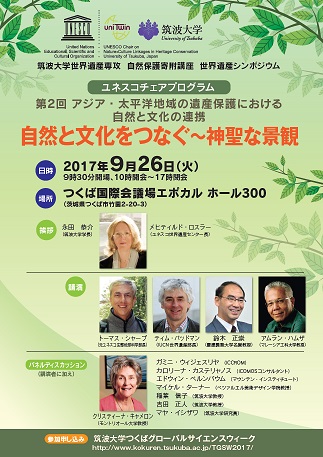【本シンポジウムは終了いたしました。ご来場、ありがとうございました】
筑波大学大学院世界遺産専攻及び自然保護寄附講座では、昨年度からユネスコ世界センター、IUCN、ICCROM、ICOMOSの協力を得て、遺産保護における自然と文化の連携を促進するためのプログラムを実施していますが、このほどユネスコ・チェアの
認可を受け、その一環として本事業を実施・継続することとなりました。
第2回目となります今年度は、「神聖な景観」をテーマに、アジア・太平洋地域を中心に16人の若手専門家を招へいしして人材育成事業を実施しますが、そのまとめを兼ねた国際シンポジウムを下記の通り開催します。
自然と文化を連携する分野で活躍している専門家のキーノートスピーチほか、研修者の成果発表、研修者を交えた専門家とのディスカッションセッションを実施します。
どうぞご参加ください。

●名 称:ユネスコ・チェア「遺産保護における自然と文化の連携」 第2回国際シンポジウム「自然と文化をつなぐ-神聖な景観」
●主 催:筑波大学大学院世界遺産専攻、同自然保護寄付講座
●日 時:2017年9月26日(火) 10:00~17:00
●会 場:つくば国際会議場エポカル ホール300
茨城県つくば市竹園2-20-3
つくばエクスプレス・つくば駅から800m(徒歩約13分)、
駅からタクシーも利用可能です(約5分)。
●参加費:無料
●主な内容
09:30 受付開始
10:00~10:15
開会挨拶・主旨説明
永田 恭介(筑波大学学長)
メヒティルド・ロスラー(ユネスコ世界遺産センター長)
10:15~12:45(11:05~11:25休憩)
基調講演
トーマス・シャープ(元ユネスコ生態地球科学部長)
ティム・バッドマン(IUCN世界遺産部長)
鈴木 正崇(慶應義塾大学名誉教授)
アムラン・ハムザ(マレーシア工科大学教授)
上記講演者によるパネルディスカッション
12:45~13:45 昼食休憩
13:45~17:00(16:00~16:20 休憩)
研修生の成果発表
総合討論(上記講演者に加えて下記の専門家及び全研修者)
クリスティーナ・キャメロン(モントリオール大学教授)
ガミニ・ウィジェスリヤ (ICCROM)
カロリーナ・カステリャノス (ICOMOSコンサルタント)
エドウィン・ベルンバウム (マウンテン・インスティチュート)
稲葉 信子 (筑波大学教授)
吉田 正人 (筑波大学教授)
マヤ・イシザワ (筑波大学研究員)
まとめ
●言 語:英語/日本語(同時通訳あり)
●申 込:筑波大学グローバルサイエンスウィークプログラムの一部として
同会場内で実施します。
下記のウェブサイトで申し込みをお願いします。
画面上部にあります「事前登録(英語画面の場合はREGISTRATION)」
から、氏名などを入力して登録を進めますとセッション名の入力画面に
入ります。
セッション名は「8-6」をご指定ください。
●問 合:筑波大学自然保護寄附講座事務局(世界遺産専攻事務室内)
Tel: 029-853-6344 Fax: 029-853-7099
Mail: nature@heritage.tsukuba.ac.jp
詳細は下記URLをご覧下さい。
自然と文化をつなぐ2017.pdf